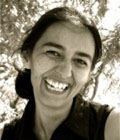Fun 'n' Games
Effect of parent-delivered action observation therapy on upper limb function in unilateral cerebral palsy: a randomised controlled trial
Overview
Unilateral cerebral palsy (hemiplegia) is the commonest form of cerebral palsy. It affects thousands of children in the UK. As there is currently no cure, improving hand function through therapy is important so that children grow up to be as independent as they can be.
Recently there has been much interest in a brain network called the “mirror neuron system”. You activate this when moving but also when watching the same movement performed by others. We know that careful watching and copying are an important way of learning new activities.
We wanted to see whether adding “watching and copying” into therapy would improve hand function more than repeated practice of movements alone. We also wanted to develop a play-based therapy that parents/carers could use at home. This is because we know that children need more frequent opportunities to practise using their hands together than most local therapy services can provide.
We developed a series of play activities useful for children with hemiplegia. For each game or toy, one set of instructions focused on watching and copying a parent’s moves. The other set focused on repeated independent practice, with the parent supporting rather than repeating the activity.
The activities were selected to be of interest to each individual child taking part and on the whole required both hands to work together. We used a range of commercially available toys and gave specific suggestions for how each child might play with them by adapting the "rules" to get the most out of the games for children with hemiplegia. Each game was chosen to work on specific aspects of movement. The trial was designed by Dr Anna Basu (paediatric neurologist and clinical academic at Newcastle University) and funded by WellChild as well as a Henry Miller Studentship to Dr Emma Kirkpatrick, who undertook the project for her PhD. Mrs Janice Pearse (senior paediatric occupational therapist at Newcastle) advised on the therapy materials and helped with the many assessments.
70 children aged 3-10 years took part in the trial in two random groups. Everyone followed a therapy programme for 3 months. This consisted of 15-minute sessions 5 days a week. All children took part in the same range of assessments.
We found that watching movements before copying them does not seem to create better results than repeated practice at home with parents. However, play activities with parents, which focus on particular hand movements, do lead to small but significant improvements in hand function.
Publications
We have written a research paper which explains in detail what we did and what we found: “Effect of parent-delivered action observation therapy on upper limb function in unilateral cerebral palsy: a randomized controlled trial”. It is an open access publication so if you are interested, you can read it here. We also have a summary on the SCOPE website.
Who was involved in this study?
The Principal Investigator for this study was Dr Anna Basu
Anna Basu
- NIHR Career Development Fellow
- Honorary Consultant Paediatric Neurologist
- Email: anna.basu@ncl.ac.uk
- Tel: 0191 282 1375
- Studies: E-SALT; eTIPS; Understanding Frames
- Recently Completed Studies: Fun 'n' Games
Also involved in the project from the Neurodevelopment and Disability Team were:
Emma Kirkpatrick
- PhD Student
Janice Pearse
- Senior Paediatric Occupational Therapist
More information
Website: research.ncl.ac.uk/hemiplegiaresearch-fungames
Other research
This study sits within the 'Effects and acceptability of interventions' research theme.
If you are looking for other research linked to Cerebral Palsy incl. Hemiplegia or Childhood Neurodisability, please view the relevant conditions and topics page for a full list of studies.
